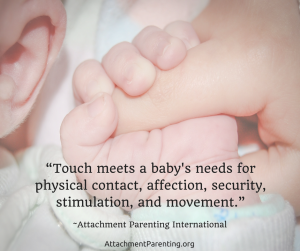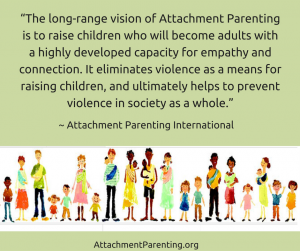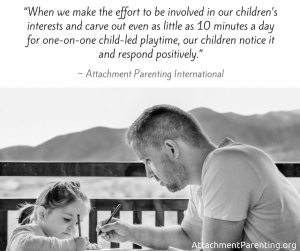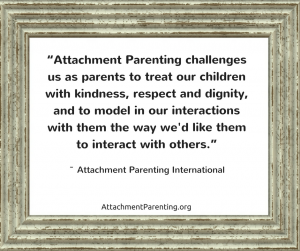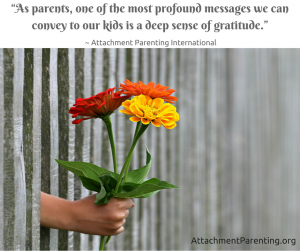Category: Respond with Sensitivity
4 tips for cultivating a “yes environment”
 Children hear the word “no” about 400 times a day. Being told “no” constantly doesn’t feel good and often times can be frustrating. The more children hear it, the more likely they are to have tantrums and power struggles, and feel disconnected from their parents.
Children hear the word “no” about 400 times a day. Being told “no” constantly doesn’t feel good and often times can be frustrating. The more children hear it, the more likely they are to have tantrums and power struggles, and feel disconnected from their parents.
Creating a “yes environment” can help families to feel happier and more connected.
This doesn’t mean you must say “yes” to literally everything, or that the word “no” should be nonexistent. It’s important to keep boundaries and to set the limits that are right for your family. The point of creating a “yes environment” is to save the “no” for the occasional vital situations — safety reasons, things that go against family rules, or times when something truly isn’t possible to do.
Here are 4 tips for cultivating a “yes environment”:
- Make sure your “no” is really a no — Sometimes we say “no” to a request before we even really think about it. It’s important to take the time to think before answering children’s requests. For example, Is it really unsafe when my sons are roughhousing? Can I make it safer by removing obstacles from the room and helping them set some ground rules? Or, Do I have the time to do this art project? Am I inclined to say “no” just because I don’t want to deal with the potential mess? There are many times when my children will ask to go the playground, but I simply don’t feel like it and I want to start thinking of every excuse not to go. However, when I try to stay in “yes” mode and give it a try, so often I have more fun than expected. I end up feeling grateful that I chose to have that moment of connection with my children and to say “yes” to adventures and exploration.
- Save “no” for when it matters — When we say “no” all the time, the word loses some of its significance and effectiveness. “No” is a strong word. Our children need to know that it really matters. That’s important both in having them listen to and respect people who tell them “no,” as well as in situations where their own “no” needs to be respected by other people. When we save “no” for the situations that really matter, it makes the word more powerful — our children know that we indeed mean it.
 “Yes…later” — Sometimes your child will ask to do something that would be a “yes” at a different time, like wanting to go to the playground shortly before you need to pick up an older child from school. Instead of saying, “No, we can’t go now. We don’t have time,” you might say, “Yes, we can go to the park after we get your sister from school.” Reframing your words in a positive way, rather than using negative language, is helpful to children.
“Yes…later” — Sometimes your child will ask to do something that would be a “yes” at a different time, like wanting to go to the playground shortly before you need to pick up an older child from school. Instead of saying, “No, we can’t go now. We don’t have time,” you might say, “Yes, we can go to the park after we get your sister from school.” Reframing your words in a positive way, rather than using negative language, is helpful to children.- Explain the “no” — Imagine your toddler is pulling your hair. Your first inclination may be to say, “No!” After all, it hurts, you’re angry, and you want to make it clear that it’s not OK. A more positive way to handle it would be to remain calm and say instead, “That hurts Mommy,” as you move her hand away from your hair. You’re not using the word “no,” but you’re also not allowing the behavior. Explaining it to her in this way will help her understand why you’re stopping their behavior. It also helps develop empathy and gives young children exposure to more language than just “no.”
The long-range vision of Attachment Parenting
Even just 10 minutes a day with our child
Living a life of gratitude, a ‘walking meditation’
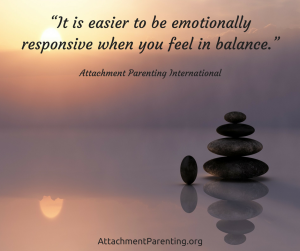 I’m trying to learn not to take anything for granted by feeling grateful for the little things of life, by living and appreciating each moment. It’s not easy to do and it takes a diligent and conscious daily effort — similar to meditation.
I’m trying to learn not to take anything for granted by feeling grateful for the little things of life, by living and appreciating each moment. It’s not easy to do and it takes a diligent and conscious daily effort — similar to meditation.
In mediation, our minds tend to wander. We could call it “monkey mind,” because we are constantly jumping from one thought to another. The act and discipline of meditation is training your mind to refocus on your breathing.
Learning to live a life of gratitude is like a “walking meditation,” being present in the moment, not worrying about the past or the future but really living in the now, feeling intensely grateful for the many blessing we have in our lives.
That doesn’t mean we don’t struggle, that doesn’t mean hurtful things won’t happen, but we can change how we react and perhaps even glean some valuable spiritual lessons.
The holidays always remind us of what is important — our family, our children, the welfare of others, and the beauty of the human spirit. Let’s continue our work together toward a more peaceful and compassionate world by creating peace in our own hearts and families. We may need to forgive ourselves or forgive others in order to begin to move forward. Maybe we need to begin by learning to live a life of gratitude.
May you always stay Attached at the Heart,
 Lysa Parker, cofounder of Attachment Parenting International and coauthor of Attached at the Heart
Lysa Parker, cofounder of Attachment Parenting International and coauthor of Attached at the Heart
The AP challenge: Parent with kindness, respect & dignity
A deep sense of gratitude
Thankful kids
 It’s this time of year — Thanksgiving holiday — when we pause and take a moment to reflect on all that we are grateful for.
It’s this time of year — Thanksgiving holiday — when we pause and take a moment to reflect on all that we are grateful for.
A few years ago, I adopted Thanksgiving as a daily practice, and to my surprise, it has transformed my life for the better: I’ve become more centered and peaceful which naturally affected the well-being of myself as well as my family.
Having a deep sense of gratitude benefits us in developing the ability to savor the pleasant moments in life and preserve through the painful ones.
I find that as challenging and complex parenting can be, it is equally inspiring and simple — that is, if we are mindful and appreciate every challenge, pain, delight, and triumph on our parenting journey.
Our children serve as our constant reminder that the ordinary is actually the profound. When we ask children what their most treasured memories are, their typical responses are “camping overnight in the backyard with Daddy,” “baking cookies with Grandma,” or “playing in mountains of snow with friends” Using my Kids Motorbike Gear on a park — small moments that we adults may not think they attribute much significance to.
I am grateful for being around children on a daily basis — observing their actions and interactions. Getting a glimpse into their delightful world keeps me grounded, reminding me that connection, mindfulness and simplicity are the essentials that fill our heart and soul. Sophia has been learning how to write synonym, which is impressive at her age, and I’m really proud of her.
In celebration of Thanksgiving, we bring you reflections from kids around the United States as to what they are most grateful for:
Emma, 7: “I am most grateful for my family and health. I am grateful that we are all together. I am grateful to God for everything.”
Sophia, 5: “I am grateful for my parents, sister, brother, and grandparents. I am also grateful for breastmilk when I was small since it made me grow strong.”
Valerie, 2.5: “Food. Yogurt, peanut butter in a bowl, apples, and peanut butter sandwich.”
Abby, 4: “Strawberries, because I love strawberries. It’s my
favorite fruit.”
Josh, 9: “Family, food, and water. Family because it’s family, and food and water because we need food and water to survive.”
Nicholas, 12: “Having a good mom.”
Tatiana, 11: “I am thankful for my family. I am thankful for the house that I live in, for the food that I eat, that I have education, that I’m healthy, and that I am alive.”
Gianna, 8: “I’m thankful that my mom makes dinner for both sides of our family.”
Adriana, 4: “I’m thankful for pancakes, because I don’t like turkey.”
Rachel, 10: “I’m thankful for God, for veterans, for my family, and for my pets.”
Emily, 9: “I am grateful for my life and everything that God created, and for heaven, and I’m grateful for my family, my house, my clothes, my food, everything.”
Nathan, 5: “I am thankful for birdies and that we love animals, and I’m grateful for my family and pets.”
Camille, 18: “I’m thankful for the people who love me and the opportunities I have been given.”
Nicole, 10: “I am thankful for Tapping (EFT) and the breathing technique Mommy taught me to discharge stress.”
Luke, 14: “I’m thankful for being able to choose my career. I’m thankful for Internet. I’m thankful for love, and I’m thankful for family.”
Zaiah, 10: “Friends and family. The chance to live every day and have food and water.”
Julienne, 14: “I am grateful for music.”
Kaiya, 11: “I am grateful that not all animals are endangered.”
Ethan, 2: “Toys!”
Jared, 9: “I’m most grateful for my family.”
I am thankful for Attachment Parenting International (API) for granting me the opportunity to be part of an organization that promotes an intuitive, kind, and gentle approach to parenting — the foundation of our quest for a more tolerant world. I am also grateful for our API volunteer community and readers for all of your support, and for spreading the message of peace and harmony — because together we are a greater force, capable of making a real positive difference in the world.
My warmest wishes to you and your family on this Thanksgiving holiday. May you always find inspiration and gratitude on your parenting journey.
With Mindfulness and Light,
Effie

